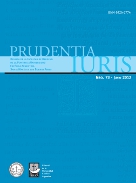Please use this identifier to cite or link to this item:
https://repositorio.uca.edu.ar/handle/123456789/2798| Título: | El pluralismo perfeccionista de la nueva escuela del derecho natural : una variación contemporánea del tomismo | Autor: | Isler Soto, Carlos | Palabras clave: | PLURALISMO; DERECHO NATURAL; TOMISMO; LEY NATURAL; PERFECCIONISMO | Fecha de publicación: | 2012 | Editorial: | EDUCA | Cita: | Isler Soto, C. El pluralismo perfeccionista de la nueva escuela del derecho natural : una variación contemporánea del tomismo [en línea], Prudentia Iuris. 2012, 73. Disponible en: https://repositorio.uca.edu.ar/handle/123456789/2798 | Resumen: | Resumen: A mediados del siglo XX, aparece en Estados Unidos la llamada “Nueva Escuela del Derecho Natural”, inspirada en una relectura de la ética tomista. Dicha escuela pretende ser, al mismo tiempo, exponente de una ética del florecimiento humano y pluralista, en cuanto acepta la existencia de diversos modos de vida igualmente perfectivos del hombre. Con ello, marca sus diferencias con la ética aristotélica tradicional, la cual sostiene que existe un modo de vida máximamente perfectivo para el hombre, el contemplativo. La “Nueva Escuela del Derecho Natural” tiene su origen histórico en la relectura de un texto tomista clásico: la Summa Theologiae i-ii q 94 a.2., y pretende, en algunos de sus autores, ser fiel exponente de la ética tomista. En el presente artículo, exponemos la doctrina pluralista de la “Nueva Escuela”, así como la teoría de los bienes humanos básicos en la que se funda, y hacemos una valoración crítica de tal doctrina. Abstract: In the middle of 20-th century, appeared in the United States the so called “New Natural Law Theory”, inspired by a re-reading of thomistic ethics. Such school claims to be, at the same time, exponent of an ethics of human flourishing, and pluralist, because it accepts the existence of multiple inconmensurable, equally perfective of man, lifestyles. Therefore, it differs from traditional aristotelian ethics, which asserts that there is a highest, most perfective for man,lifestyle, the contemplative one. The “New Natural Law Theory” has its historical origin in the rereading of a classic thomistic text: the Summa Theologiae I-II q. 94 a.2, and it claims to be, in some of its authors, a true exponent of thomistic ethics. In the present paper, i expose the pluralist doctrine of the “New Theory”, and its theory of human basic goods, which grounds the former, and i conclude with some critical remarks on such doctrine. |
URI: | https://repositorio.uca.edu.ar/handle/123456789/2798 | ISSN: | 0326-2774 | Disciplina: | DERECHO | Derechos: | Acceso Abierto | Fuente: | ISSN 0326-2774 |
| Appears in Collections: | PI - 2012 nro. 73 |
Files in This Item:
| File | Description | Size | Format | |
|---|---|---|---|---|
| pluralismo-perfeccionista-nueva-escuela.pdf | 321,18 kB | Adobe PDF |  View/Open |
Page view(s)
175
checked on Apr 30, 2024
Download(s)
212
checked on Apr 30, 2024
Google ScholarTM
Check
This item is licensed under a Creative Commons License

